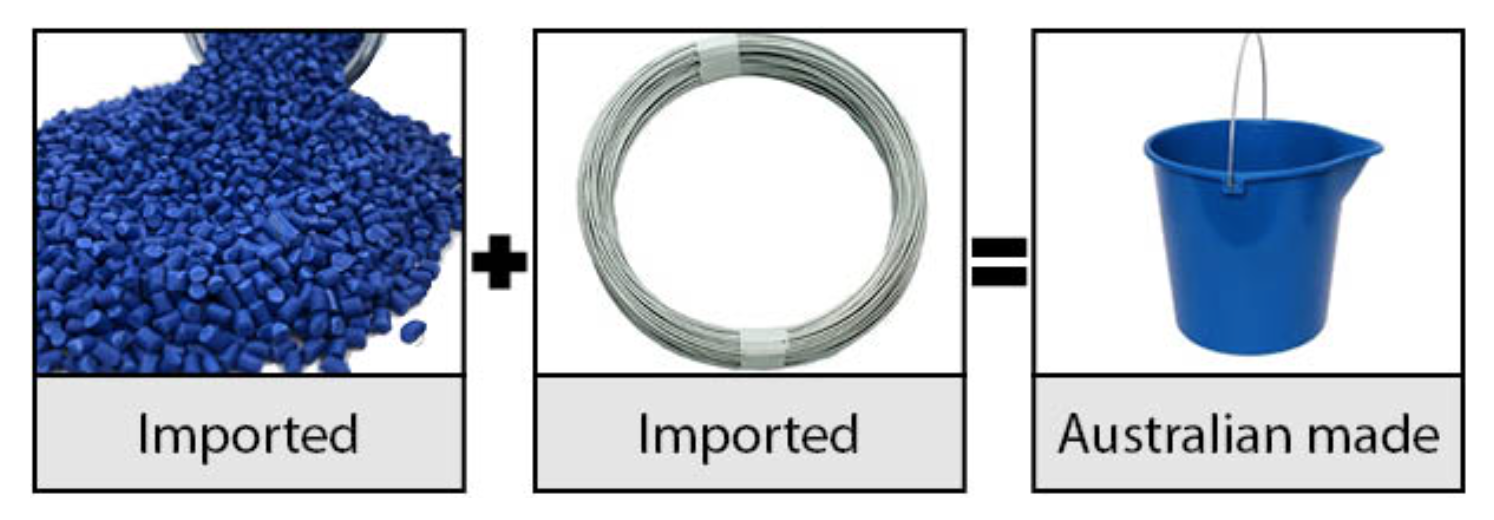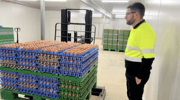I try to buy as much Aussie made as possible, this makes me angry. At least Ash Barty is Aussie Made.Is ‘Australian Made’ a giant scam?
We all love to be patriotic and support Australia, but what does it actually mean when a product is labelled as "Australian made"? You'd be forgiven for thinking this was a silly question.
"Australian made" just means that the product has been manufactured in Australia, right?
Well, no.
According to the AMCL (the managers of the familiar green and gold kangaroo logo we're all so familiar with), "A product can be described as 'Australian made' or 'made in Australia' if it underwent its last substantial transformation in Australia.
That means that a product doesn't need to be entirely, or even majority made in Australia to be technically considered ‘Australian made’ (and thus, be entitled to use the Australian made logo).
The AMCL cites the following example on its website:
“A business buys imported plastic pellets and wire. Through an injection moulding process, the pellets are melted and formed into a bucket. The wire is cut and bent to form a handle. The end product (the bucket) is fundamentally different to all the imported ingredients. The product has been substantially transformed in Australia.”

Image source: Australianmade.com.au.
In the above example, none of the materials in the ‘Australian made’ bucket are actually made in Australia, but the product is still legally considered to be Australian made because the plastic and wire was ‘transformed’ in Australia.
Just to be crystal clear on this point: As bizarre as it may sound, there is no requirement for a percentage of the ingredients or components to come from Australia when determining whether a product is Australian made. Nor is there any requirement that a certain proportion of the cost of manufacturing the product is incurred in Australia (there was previously a requirement that at least 50% of the manufacturing cost had to be incurred in Australia, but this was removed in 2017).
There are likely thousands of ‘Australian made’ products out there that contain zero Australian materials (some of which we're probably paying a premium for to 'be patriotic'). Do you think the definition of ‘Australian made’ needs to be changed?
You are using an out of date browser. It may not display this or other websites correctly.
You should upgrade or use an alternative browser.
You should upgrade or use an alternative browser.
I don't have a problem with this one as the item is made in Australia, albeit from imported products. I doubt if there are many wire and plastic bead manufacturers in Australia and they would no doubt be much more expensive. If they were competitive the manufacturer would buy local. I would much prefer this bucket than buying one made entirely in China, even if I did pay a bit more.It’s not only products like the bucket. Whilst that example to me, is cheating, at least it’s not likely to harm anyone.
My main concern lies with food products. I recently became aware of what I consider to be a massive scam perpetrated by New Zealand. You look for the country of origin, and find Product of New Zealand. However, apparently there’s an arrangement between New Zealand and China, whereby New Zealand imports fresh frozen food from China. It is then packed in New Zealand.
We used to buy frozen berries and other things because New Zealand is our next door neighbour, so we can trust them, right? We never buy anything purporting to be made in New Zealand now, because it probably comes from China, where hygiene standards are often well below what we in Australia would consider mandatory.
We check country of origin on everything now, from butter to a mattress. It pays to become educated.
but surely these "idiots" have wives or mothers or others that do shopping, would it be so hard for them to even THINK of asking them what information they would like to see displayed on lables ? I do agree with your criticsm though.Most labelling laws in Australia are a joke, thought up and proclaimed by idiots who have absolutely NO consideration of what information the consumer wants to make informed decisions when purchasing products
This is the nub of the problem- everything starts and ends here unfortunatelywhenever wages go up $10 EVERYTHING has to go up too, transport costs (because the drivers wages come into the wage hike) food (because the worker's wages have gone up, and also, that little bit extra because transport costs are up to deliver the initial materials and also to deliver the end product to the shops) fuel costs go up to compensate for the wage increase so therefore transport costs have to go up to cover the extra fuel cost.
$10 wage increase has SUCH a widespread follow-on (increase in overheads for the busnisses like insurance, worker's compo, power supply etc etc, the list of follow-ons goes on and on) but without the wage increase you can't afford the things you need.
$10 means $12-$13 extra to find to buy things
it's really like a dog chasing its tail.
Is ‘Australian Made’ a giant scam?
We all love to be patriotic and support Australia, but what does it actually mean when a product is labelled as "Australian made"? You'd be forgiven for thinking this was a silly question.
"Australian made" just means that the product has been manufactured in Australia, right?
Well, no.
According to the AMCL (the managers of the familiar green and gold kangaroo logo we're all so familiar with), "A product can be described as 'Australian made' or 'made in Australia' if it underwent its last substantial transformation in Australia.
That means that a product doesn't need to be entirely, or even majority made in Australia to be technically considered ‘Australian made’ (and thus, be entitled to use the Australian made logo).
The AMCL cites the following example on its website:
“A business buys imported plastic pellets and wire. Through an injection moulding process, the pellets are melted and formed into a bucket. The wire is cut and bent to form a handle. The end product (the bucket) is fundamentally different to all the imported ingredients. The product has been substantially transformed in Australia.”

Image source: Australianmade.com.au.
In the above example, none of the materials in the ‘Australian made’ bucket are actually made in Australia, but the product is still legally considered to be Australian made because the plastic and wire was ‘transformed’ in Australia.
Just to be crystal clear on this point: As bizarre as it may sound, there is no requirement for a percentage of the ingredients or components to come from Australia when determining whether a product is Australian made. Nor is there any requirement that a certain proportion of the cost of manufacturing the product is incurred in Australia (there was previously a requirement that at least 50% of the manufacturing cost had to be incurred in Australia, but this was removed in 2017).
There are likely thousands of ‘Australian made’ products out there that contain zero Australian materials (some of which we're probably paying a premium for to 'be patriotic'). Do you think the definition of ‘Australian made’ needs to be changed?
AMCL requires a change with real Australian employees, the current crop of so called Australians don’t deserve to be employed in this organisation when having no idea what the meaning of Australian made requires. I would have thought it was plain to understand by most people.Is ‘Australian Made’ a giant scam?
We all love to be patriotic and support Australia, but what does it actually mean when a product is labelled as "Australian made"? You'd be forgiven for thinking this was a silly question.
"Australian made" just means that the product has been manufactured in Australia, right?
Well, no.
According to the AMCL (the managers of the familiar green and gold kangaroo logo we're all so familiar with), "A product can be described as 'Australian made' or 'made in Australia' if it underwent its last substantial transformation in Australia.
That means that a product doesn't need to be entirely, or even majority made in Australia to be technically considered ‘Australian made’ (and thus, be entitled to use the Australian made logo).
The AMCL cites the following example on its website:
“A business buys imported plastic pellets and wire. Through an injection moulding process, the pellets are melted and formed into a bucket. The wire is cut and bent to form a handle. The end product (the bucket) is fundamentally different to all the imported ingredients. The product has been substantially transformed in Australia.”

Image source: Australianmade.com.au.
In the above example, none of the materials in the ‘Australian made’ bucket are actually made in Australia, but the product is still legally considered to be Australian made because the plastic and wire was ‘transformed’ in Australia.
Just to be crystal clear on this point: As bizarre as it may sound, there is no requirement for a percentage of the ingredients or components to come from Australia when determining whether a product is Australian made. Nor is there any requirement that a certain proportion of the cost of manufacturing the product is incurred in Australia (there was previously a requirement that at least 50% of the manufacturing cost had to be incurred in Australia, but this was removed in 2017).
There are likely thousands of ‘Australian made’ products out there that contain zero Australian materials (some of which we're probably paying a premium for to 'be patriotic'). Do you think the definition of ‘Australian made’ needs to be changed?
Judy, that is heart breaking. However, I think that progressive Australian governments have been slowly selling parcels of Australia off to foreign countries over many years...China, Japan, to name a couple., mining, coal bearing land, India...I think it's disgusting that Australian made isn't really all made in Australia. Recently on a trip to North Queensland we bought some aboriginal art, thinking we were supporting the local community. Unfortunately we discovered they were made in China
Why are our assets being sold off?
Foreign investors are pushing up house prices and they don't even live here, they rent them out! This is putting housing and rentals out of the reach of ordinary Aussies who live here.
Wake up Australia before we have to learn to speak another language and learn new customs.
They probably do ?, but can you name ONE lawmaker, politician, or idiot making these guidelines and regulations, who ever considers the next person or thinks beyond his/her own pocket and self preservation or survival? I'm sure you won't find him/her in Australia....but surely these "idiots" have wives or mothers or others that do shopping, would it be so hard for them to even THINK of asking them what information they would like to see displayed on lables ? I do agree with your criticsm though.
SDC Rewards Member
Upgrade yours now
K
Yes, while showing the item is made in Australia it should also reveal the countries where components are sourced from !Is ‘Australian Made’ a giant scam?
We all love to be patriotic and support Australia, but what does it actually mean when a product is labelled as "Australian made"? You'd be forgiven for thinking this was a silly question.
"Australian made" just means that the product has been manufactured in Australia, right?
Well, no.
According to the AMCL (the managers of the familiar green and gold kangaroo logo we're all so familiar with), "A product can be described as 'Australian made' or 'made in Australia' if it underwent its last substantial transformation in Australia.
That means that a product doesn't need to be entirely, or even majority made in Australia to be technically considered ‘Australian made’ (and thus, be entitled to use the Australian made logo).
The AMCL cites the following example on its website:
“A business buys imported plastic pellets and wire. Through an injection moulding process, the pellets are melted and formed into a bucket. The wire is cut and bent to form a handle. The end product (the bucket) is fundamentally different to all the imported ingredients. The product has been substantially transformed in Australia.”

Image source: Australianmade.com.au.
In the above example, none of the materials in the ‘Australian made’ bucket are actually made in Australia, but the product is still legally considered to be Australian made because the plastic and wire was ‘transformed’ in Australia.
Just to be crystal clear on this point: As bizarre as it may sound, there is no requirement for a percentage of the ingredients or components to come from Australia when determining whether a product is Australian made. Nor is there any requirement that a certain proportion of the cost of manufacturing the product is incurred in Australia (there was previously a requirement that at least 50% of the manufacturing cost had to be incurred in Australia, but this was removed in 2017).
There are likely thousands of ‘Australian made’ products out there that contain zero Australian materials (some of which we're probably paying a premium for to 'be patriotic'). Do you think the definition of ‘Australian made’ needs to be changed?
I remember at one stage some years ago the Made in Australia Labels were printed in China.....someone got a kick up the butt for that I believehow so disappointing, thank goodness at least part of the process occurs here in Australia BUT that is not good enough!!
Like the Coles Bacon I keep commenting on.. "Made in Australia" in big letters on a green background..."From at least 18 percent Australian Ingredients"...So all this Coles advertising about we support Australian Farmers 100% is a crock of stuff....that has got to be false or misleading advertising.Yes, while showing the item is made in Australia it should also reveal the countries where components are sourced from !
I wrote to Coles about that but they could not get back to me until I supplied a bar code off the product and a receipt and a date.
I asked them a simple question..
"Where do you source your Bacon From?"
Below is the response to that simple Question.
Dear David,
Thank you for your enquiry regarding bacon.
Unfortunately, with the information you have provided, we’re unable to provide an accurate response. In order for us to look into this, we will require specific product information. We would appreciate it if you could please provide the barcode number for the product. If you’re unable to provide a barcode, can you please send us an image and provide your local store?
Once we have located the correct product, we will forward your concerns to our relevant team and respond as soon as possible.
Yours Sincerely,
Mary Joy
| Coles Customer Care PO Box 480 Glen Iris Victoria 3146 Australia T 1800 061 562 E Contact Us |
| |
90% of bacon sold in supermarkets are only sliced and packaged here. As the label tells you some only 2% Australian. It should be against the law to allow this to have Australian made on the label at all.Like the Coles Bacon I keep commenting on.. "Made in Australia" in big letters on a green background..."From at least 18 percent Australian Ingredients"...So all this Coles advertising about we support Australian Farmers 100% is a crock of stuff....that has got to be false or misleading advertising.
I wrote to Coles about that but they could not get back to me until I supplied a bar code off the product and a receipt and a date.
I asked them a simple question..
"Where do you source your Bacon From?"
Below is the response to that simple Question.
Dear David,
Thank you for your enquiry regarding bacon.
Unfortunately, with the information you have provided, we’re unable to provide an accurate response. In order for us to look into this, we will require specific product information. We would appreciate it if you could please provide the barcode number for the product. If you’re unable to provide a barcode, can you please send us an image and provide your local store?
Once we have located the correct product, we will forward your concerns to our relevant team and respond as soon as possible.
Yours Sincerely,
Mary Joy
Coles Customer Care
PO Box 480
Glen Iris Victoria 3146 Australia
T 1800 061 562
E Contact Us



Join the conversation
News, deals, games, and bargains for Aussies over 60. From everyday expenses like groceries and eating out, to electronics, fashion and travel, the club is all about helping you make your money go further.
Seniors Discount Club
The SDC searches for the best deals, discounts, and bargains for Aussies over 60. From everyday expenses like groceries and eating out, to electronics, fashion and travel, the club is all about helping you make your money go further.
Latest Articles
-
-
Reused signature among string of issues as home owner left with unfinished build

- Started by ABC News
- Replies: 0
-
Raise a glass! Enjoy $100 off your first case from Naked Wines today

- Started by Aubrey Razon
- Replies: 0
-
Millions being spent as Australia prepares for deadly H5 strain of bird flu

- Started by ABC News
- Replies: 0
-
Dodo and iPrimus hack impacts more than 1,600 home internet, email and mobile customers

- Started by ABC News
- Replies: 0

